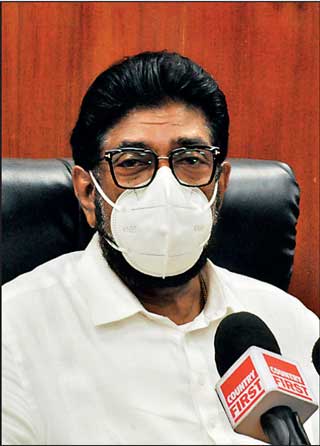Wednesday Feb 25, 2026
Wednesday Feb 25, 2026
Friday, 25 March 2022 00:23 - - {{hitsCtrl.values.hits}}
By Shailendree Wickrama Adittiya
Sri Lanka has sufficient stocks of critical medicine for a month, Health Minister Keheliya Rambukwella said yesterday, adding that the country’s fuel shortage will be solved within the next three weeks.
 |
| Health Minister Keheliya Rambukwella – Pic by Lasantha Kumara |
Addressing the media to shed light on the proceedings at the All-Party Conference held on Wednesday, Rambukwella said, in terms of medicines, a more long-term approach is being taken by assessing needs of the next six months, as opposed to short-term monthly assessments. “We have critical medicines for the next month or so. With the $ 100 million received, we will get it within the next week,” he said, adding that there is thus no shortage of critical and important medicines.
He went on to say that Sri Lanka imports the majority of its drugs from India.
According to Rambukwella, 75% to 80% of Sri Lanka’s drug imports are from India, 5% to 10% from Pakistan and Bangladesh, and 5% from China. A very small amount is imported from Europe.
“We got the $ 100 million three days ago and we will have that within the week at most. So there won’t be a shortage in the critical and important medicines,” the Health Minister said, admitting that there was a delay in supplies, which has been managed.
In terms of the country’s fuel shortages, Rambukwella said an end to shortages is expected in three weeks’ time. “The general requirement of gasoline is around 5,500 tonnes a day. This is the daily requirement, but right now it goes up to 8,000 plus tonnes which means there are around 2,500 to 3,000 tonnes that will usually not be used,” he said, explaining that the increase in demand has also contributed to long queues at fuel stations.
Rambukwella added that pricing and tariffs may have to be revisited as well, given global fuel prices.
Regarding the All-Party Conference, Rambukwella said they are of the view that the meeting was successful. “The idea was that it is a fact that we are having a foreign currency crunch and an overall economic issue in Sri Lanka at the moment,” he said, adding that sub-committees will be formed to discuss matters concerning the economy.
Welcoming assistance from all parties, Rambukwella said there is no point blaming the past as the current problem is one faced by the present Government.
“We are looking at multi-ways of handling this issue. I do not think you can go in one direction. The IMF could be one source of discussion to see how we could get out of this situation. We have 5.5 billion to be paid within the year,” he said, adding that they were looking at ways to tackle these issues.
In terms of the IMF, the final report will be brought before Parliament once it is prepared. However, this would not take place overnight as negotiations will have to be made.
According to the Minister, countries like India have also come forward to assist Sri Lanka. “We are also looking at other countries where we have facilities extended, like Japan, the Gulf area, and also China,” Rambukwella said.
He went on to say that rescheduling of loan repayments is one option, but it is not looked at very favourably. Instead, the country was looking at alternatives to extend the period of repayment in some form or another.
While concerns are raised about the situation in the country, Rambukwella showed confidence in the Sri Lanka Podujana Peramuna (SLPP) and the ability to “hold our troops together.”
“We find that with whatever difficulties that we are facing as the Government, the party is confident that things will settle down,” he said.
Regional Co-operation State Minister and SLPP Parliamentarian Tharaka Balasuriya shared a similar sense of optimism.
“Personally, I believe, this is the right time for us to be thinking about long-term structural changes, which the whole country is long overdue for,” he said, adding that the same problems will arise in the future if we carry on as we have during the past 73 years.
Thus, fundamental structural changes are required to take the country forward.
“We have approached our other bilateral partners to see whether we can have some sort of a credit line or swap arrangement. These are mainly short-term in nature, thereby the essential necessities people require can be provided,” Balasuriya said.
“I am certain that the negotiations with the IMF will be very conducive,” he went on to say, adding that assurance was given of any help and intervention with this regard during recent discussions held with US Under Secretary of State for Political Affairs Victoria Nuland and US Ambassador Julie Chung.
Balasuriya called the meeting held on Wednesday very productive, adding, “We spoke on an array of subjects, including security, conflict corporation and also things such as human rights and reconciliation in Sri Lanka, and also education and other aspects.”
He added that discussions also touched on a new counter-terrorism bill that accommodates modern realities of terrorism, like cyberterrorism. Balasuriya said follow-up meetings will take place with the US Embassy.